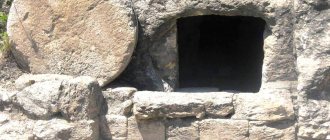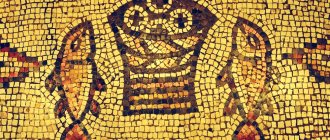For the beginning Christian
Published 11/15/2017
So why did Judas Iscariot betray Jesus Christ ? The name Judas has been associated with betrayal for many centuries and has become a household name. Judas is not mentioned many times in the Bible, but his reasons for betraying Jesus are well described. Let's figure it out.
Judas Iscariot stole money from the apostles
This fact must be known in order to draw the correct conclusion about why Judas betrayed Jesus Christ. Judas loved money and was a thief. He was stealing from the donation box. The Bible also says that “the love of money is the root of all evil. Some, in their desire for them, have wandered away from the faith and brought severe misfortune to themselves,” says the first letter to Timothy. But this is exactly what happened to Judas.
One of Jesus’ disciples, Judas Iscariot, who later betrayed Him, said: “Why wasn’t this perfume sold for three hundred silver coins and the money given to the poor?” He said this not because he was worried about the poor, but because he was a thief: he had their donation box with him and stole what they put in it. (John 12:4-6)
Judas, although he was physically with other Christians, and was himself considered a disciple of Christ, allowed himself to steal from the common donation box. Knowing this, we now move on to the next passage of the Bible.
Betrayal of Judas
We have seen that on earth, in human council, it is decided not to deprive the Prophet of Galilee of his life until the end of the Easter holiday; otherwise it was ordained in heaven, in the council of the Almighty! The Lamb of God, who takes away the sins of the world, had to be sacrificed at the same time as the Passover lamb, which for so many centuries served as His prototype (1 Cor. 5:7), and no earthly power, no malice and cunning could slow down this sacrifice, separate the prototype with the prototype. The providence of God, on the contrary, arranged the course of circumstances in such a way that the same people who, without knowing it themselves, went contrary to His eternal destinies, without knowing it themselves, suddenly turned to fulfilling them, deciding to act immediately, to capture and kill Jesus Christ at the first opportunity. The reason for such an unexpected change was one man who, having appeared before the high priests, announced that he, having long been one of the disciples and constant companions of Jesus and therefore knowing all the secret places of His residence, could easily contribute to their long-standing desire - to seize Him into their hands secretly from the people (Luke 22:6) and is ready to use all his means and strength for this purpose, if only the supreme government deigns to pay favorable attention to such an important service, which few are capable of, although everyone was obliged, as a result of the command recently issued by the Sanhedrin (John 11:57). This pitiful man really belonged to Jesus’ inner circle and was the same disciple who, at the supper in Bethany, feigned pity for the world and the poor, and against whose love of money the far-sighted John had long warned us (John 12:6); it was Judas Iscariot. Later we will see what prompted him to a terrible betrayal of his Teacher and Lord; Here we will only note that, as the custodian of money in the small society of Jesus, Iscariot could plausibly leave this society and go shopping in the city; and therefore had the opportunity to conduct shameful negotiations with the enemies of his Teacher and bargain for His life, without being suspected of treason by anyone.
The appearance of a man with such a proposal, as the evangelists noted (Luke 22:5), was extremely pleasant for Caiaphas. The cunning Sadducee instantly calculated in his mind that with the help of such a person as the traitor appeared to be, it would be possible to capture Jesus Christ without any noise, even without the presence of the people. By immediately condemning Him to death and delivering Him into the hands of the Roman government, it was intended to protect oneself from the final danger. The people, they thought, would not dare to do anything against the Romans, who especially strengthened their military posts in Jerusalem during Easter; and even if he encroached on something, the Sanhedrin would not be responsible for it. The fact that Jesus Christ would be betrayed by His disciple had a special value in the eyes of His personal enemies: because before the people, who did not know the true reasons for the betrayal, this circumstance could be turned into a big disadvantage for Jesus, who was apparently valued so little by his own disciples . In the heat and blindness of fanaticism, the traitor to some of those blindly following the law could seem like a man righteous according to the law. That he would keep his word and not deceive the Sanhedrin, as he deceived the Teacher, for this, in addition to other circumstances (Judas, no doubt, took care of gaining confidence in himself), was already guaranteed by his extreme greed for money, which exposed the baseness and blackness of his soul, ready all because of profit.
The price of betrayal is immediately set - the same one that Moses ordered to exact for a slave when he was killed by someone unintentionally (Exodus 21:32), that is, thirty pieces of silver, or shekels, in our money this is about 60 rubles. The wit of some scribe probably wanted to distinguish himself by valuing the life of Jesus Christ at the price of a slave, which, no doubt, was low in the time of Moses, and now, 2000 years later, even lower. All the more surprising is the greed of the traitor, which could be satisfied with such little in such a case when the enemies of Jesus Christ, in all likelihood, would not have stinted with any pieces of silver. But it is unlikely that, in the event of successful completion of the matter, a large sum was not promised, as the expressions of the evangelists - Mark and Luke - suggest. On the other hand, the traitor was ashamed to persistently insist on a larger payment if he wanted (as it should be assumed) to give his betrayal in the eyes of the high priests the appearance of a legitimate patriotic act and not seem like a clearly despicable traitor bargaining for his conscience. However, to act recklessly, often contrary to their own benefits, is the lot of those possessed by the passion of love of money: small things sometimes seem great to them, great things small, and they, having only money in mind in everything and always, despite this, without knowing it themselves, show in their actions sometimes have a kind of selflessness. Neither the traitor nor the high priests could determine the time and manner of the tradition with accuracy, although, without a doubt, it would have been pleasant for both, and it seems that they thought a lot about it (Mark 14:11). The traitor only undertook to take advantage of the first opportunity, that is, when it would be possible to do this secretly from the people (Luke 22:6); and the high priests promised, at the first request of Judas, to send him a sufficient number of servants and church guards to carry out his work. Easter night, as the darkest time and therefore convenient, no doubt came to mind for both; and if now she was not decisively chosen to fulfill the plan, then it must be because Judas did not yet know where the Teacher would spend this night, and perhaps he still probably did not know whether He would now celebrate Easter on at the same time with others, that is, due to the great danger that surrounded Him on all sides, will this celebration be postponed (as allowed by the law itself) until the next month.
Imagining how the unfortunate disciple returns by secret ways from the palace of Caiaphas to the holy society of Jesus, in order to play the role of an apostle in it for the time being, and imagining, on the other hand, how difficult it was, having been so long in close proximity to the Son of God, not to become good, not to borrow the Spirit of God from Him, you involuntarily come to amazement and ask with the Church: “What image have you, Judas, made a traitor to the Savior? Separate food from your apostolic face? Does food give healing? Will I take away the food from your meal after supper? Oh, how many blessings you were not mindful of!”
Evangelists unanimously explain the betrayal of Judas by the inspiration of Satan (Luke 22:3). Indeed, only Satan could make a traitor and a son of destruction out of an apostle. But what good was it for him, someone might think, to teach Judas the tradition of the Teacher, when the death of the Lord, which followed, completely destroyed the works of the devil along with his kingdom? Doesn’t this mean forging weapons for oneself, seeking one’s own destruction?.. Yes! But we must remember that the mystery of the redemption of the human race through the death of the Son of God was unknown to the spirit of darkness. Under the roof of this secret, the Wisdom of God, laughing at the machinations of the primordial enemy, caused him to arrange his own destruction in this case. He only wanted to put an end to the unbearable action of the preaching and miracles of Jesus Christ for him, just as he brought the prophets to martyrdom and recently, with the hands of the wicked Herod, sealed the lips of John the Baptist; but in this case, the completely opposite happened: the death of the Son of God, which cost so much effort to the enemy of the human race, inflicted a decisive defeat on him, his power of sin and death was overthrown once and for all.
However, the evangelists, pointing to Satan as the first culprit of the betrayal of Judas, do not forget the so-called second reasons, or natural ones. Exactly, St. John points, so to speak, to that hole (John 12:6), through which this ancient serpent crawled into the soul of the unfortunate apostle and imperceptibly entangled his mind and heart. This is a passion for pieces of silver, which, having long originated in the soul, smoldered throughout his stay with Jesus, feeding on the theft of public money, and now flared up into a completely hellish flame, where, as in his palace, Satan sat and reigned. Finally, St. Matthew and Mark (Matthew 26:1-16; Mark 14:3-11), with the intention of bringing together two different circumstances: the Bethany supper, at which Judas regretted the world, and the betrayal of the latter, allow the discerning reader to see how the devil put the last noose on the soul of the money-lover in order to drag him with him to hell. Strongly touched by the loss of the profit that could have been obtained from the money for the sale of the world and, perhaps, upset by the reproach made on that occasion by Jesus, the money lover, in a fit of passion, decided to compensate for his imaginary loss by selling the Teacher Himself, Who with His selflessness and poverty It was becoming more and more of a burden to him from day to day. “Lute,” St. exclaims on this occasion. Chrysostom, - the fierce beast is the love of money; from here are the grave-diggers, from here are the man-killers, from here are the battles and battles, and even if you say all kinds of evil, from here there is.”
The evangelists say nothing more to explain Judas’s act, although some aspects of it remain unclear; and we should not be surprised at such silence, remembering how brief the evangelists are in general in describing the darkest subjects and how difficult it was for them to talk about such a grave and irrevocable fall of their brother. What is more surprising, according to Chrysostom’s remark, is their self-sacrifice, that they “conceal nothing from those who pretend to be blasphemous. It would be powerful to tell them simply that there was no one who was a traitor from His disciples; now they add, as if from twelve, they allegedly said, “the first person, from the fairly chosen ones, who were with Peter and John.” See that they cared about one thing, about one truth, so that they do not hide what is happening” (Conversations 80 on Matt.).
The sides of Judas’ betrayal, which are not entirely clear, are the following: how, firstly, did Judas, in the words of Chrysostom, “want to hold back Jesus, having seen Him many times, who passed through and was not held back, and His Divinity and His power gave many indications?” Secondly, when betraying the Teacher, did Judas regard Him as the Messiah, at least as a great prophet and righteous man, or did he not? If you did, how did you betray it? If he didn’t honor it, then where did he show such great repentance after? Since the condemnation of Jesus to death shocked Judas so much, it is clear that he did not expect this condemnation. What did you expect? Voluntary recognition of Him by the Sanhedrin as the Messiah? But this was impossible to assume. The miraculous victory of Jesus over the high priests? But in this case, with what face would the traitor appear to the Devotee?
Similar considerations, even in ancient times, led some teachers of the Church to the opinion that Judas did not want or expect the death of his Teacher, assuming that He would find a means, natural or supernatural, to get rid of the hands of His enemies unharmed. In modern times, this opinion has been supplemented, developed and applied to all the details of the event as follows.
All the disciples of Jesus Christ expected to see Him as the King over Israel and to be the first servants in this kingdom; but Judas, they say, due to his selfish disposition, cared more than anyone else about the success of his Teacher’s work and for this purpose he constantly, with all attention, observed the circumstances, the opinions of the people about Him, the actions and plans of His enemies, and so on. Now he clearly saw that the dispute between the Teacher and the Sanhedrin had reached a decisive turning point, and believed that this turning point must certainly end in favor of his Teacher, if only it would follow during the holiday, with the gathering of numerous people so strongly disposed towards Jesus Christ. On the other hand, the unfortunate man saw with bitterness that the Teacher had absolutely no intention of taking advantage of this extremely favorable set of circumstances. To his greater chagrin, he later learns that the high priests unanimously drew up a cunning plan to finally destroy Jesus after the holiday. "What to do? - thought the cunning, self-interested man, - if we leave things the way they are going, then we all cannot avoid destruction: the last favorable opportunity for us will be missed; and Iscariot, as the last criminal, will perhaps get to hang on some cross.” “No,” whispered the devil, “this will not happen: as long as Judas is in the company of these people, the high priests will not get the better of us. They postponed our destruction until the holiday; it is necessary to do exactly the opposite of this: the Sanhedrin issued a command that anyone who finds out where Jesus is should let him know about it (John 11:57). What is more plausible than a pretext? I will appear to Caiaphas with a challenge to betray Jesus at the first opportunity: thus, their blind malice will still pay me for my own destruction. Exactly death: I will sell them Their own death! How excited the people will be when they learn that the Messiah is in chains! What will he not do to overthrow the unloved Sanhedrin and the hated Praetorium! The Teacher, willy-nilly, will become the king of Israel, and Iscariot will have the honor of being the first culprit of such a happy revolution. So let us create evil so that good may come (Rom. 3:8). Let us take upon ourselves for a while the dark face of the traitor, so that later we may be the first of the apostles in the kingdom of the Messiah. Neither Peter nor John could invent such a plan. A teacher who knows how to appreciate actions so well will not be slow to do justice to a consideration so profound and so successful.”
This is how, they say, one should think about the betrayal of Judas: because with this only assumption it becomes clear how the traitor could be satisfied with such a small reward; the pieces of silver were not the main target of betrayal; he would have settled for less. At the same time, they say, we also understand how Judas himself volunteered to lead the guards to take Jesus, to greet Him with a friendly greeting and even kiss Him: an act that otherwise could only be a consequence of the most disgusting personal malice against the Teacher, traces of which however, it is not visible in Judas. Finally, they say, it is clear why Iscariot was affected so strongly and in such a direction by the news of the Teacher’s condemnation to death: in this case, he had to grieve purely - both for the Teacher and for himself, having been so terribly deceived in his calculations. People of strong character in such circumstances usually turn to one desperate remedy: patet exitus (the outcome is found). In carrying out his evil, cunning and unfortunate plan, they add, the traitor could even rely on the magnanimous condescension of his Teacher to calm himself down, according to which the latter did not reveal him to other students and did not expel him from His society. Finally, the words: do it quickly (John 13:27), they say, could have been taken by Judas as a decisive approval of his plan by the Teacher.
What does impartial history have to say about such assumptions? The fact that these are guesses, coming, as we noticed, from antiquity, approaching plausibility in some ways, but not having a solid historical basis and at the same time, they themselves strongly lament some direct indications of history to the opposite of what is assumed. In fact, no matter who you listen to in this matter, you always hear the opposite. Should I accept my own confession as a traitor? He says that he betrayed innocent blood (Matthew 27:4); but not a word about the fact that it was not greed for money that prompted him to betray, but the desire to quickly enthron the Teacher. On the contrary, the expressions: sinners, betraying blood, clearly show that in the legend there was a direct sale of this priceless blood. Will we listen, as we should, to the evangelists? They, too, did not say a word about this - whereas an indication of such reasons and the purpose of betrayal, easing the guilt of the traitor, would have eased their grief when the whole world became aware of such a base act of their former brother. Let us turn with reverence to the testimony of the most devoted God-man: what do we hear? Woe to the man to whom the Son of Man is betrayed; It would have been good for him if that man had not been born (Matthew 26:24). Why such a terrible condemnation if the betrayal had such a benign purpose as is supposed? In this case, it would be very similar to the so-called pious deceptions of the Middle Ages and would not deserve such a terrible sentence. Anyone who reflects can easily find other reasons to remain with the simple story of the evangelists, which, while leaving the details of events in the shadows, nevertheless sheds quite a bit of light on their essence. As for the above-mentioned perplexities, they, as we will see (when we talk about the tragic end of the traitor), are resolved quite satisfactorily and without such assumptions.
What can we learn from the example of Judas Iscariot?
1. The blessing of the Lord can be lost due to wickedness
14. Try to have peace with everyone and holiness, without which no one will see the Lord . 16. So that there may not be any fornicator or wicked man among you, who, like Esau, would give up his birthright for one meal. 17. For you know that after this he, desiring to inherit the blessing, was rejected; I couldn’t change my father’s thoughts , although he asked for it with tears. (Hebrews 12:14,16,17)
2. All the wicked will be spiritually blinded
- 12 Let all those who did not believe the truth but delight in unrighteousness be condemned. 11 And for this reason God will send them strong delusion , so that they will believe lies , 9(b,c) according to the working of Satan, with all power and signs and lying wonders (2 Thessalonians 2:12,11,9(b,c ))
It is the wicked who will be deceived by false Christs and false prophets
— 24 For false Christs and false prophets will arise and show great signs and wonders to deceive, if possible, even the elect. (Matthew 24:24)
As we read in the last section, the ability to recognize false Christs will not depend on the level of intelligence, but on how pure the person is in the eyes of God. But God will send delusion upon the wicked and they will believe lies.
In dictionaries
Explanatory dictionary of the Russian language (1992) Ozhegova S.I., N.Yu. Shvedova:
Judas , husband. (simple contempt). Traitor, traitor [named after the Apostle Judas Iscariot, who, according to the Gospel legend, betrayed Jesus Christ to the high priests]. Despicable Judas.
Explanatory dictionary (1935 – 1940) D. N. Ushakova:
Judah (Judas), (And capital), Judas, husband. (expletive). Traitor, traitor. “Where is the villain? Where did Judas run in fear?” Pushkin. (On behalf of the Apostle Jude, who, according to the Gospel story, betrayed Jesus Christ.)
Considered himself unworthy to be called a brother of God
And what about the other apostle Judas, called Thaddeus or Levway, the brother of the Lord? Most non-church people do not even realize that there was a holy Apostle Judas Jacob, who remained faithful to the Lord Jesus Christ, preached the Gospel and accepted martyrdom for the Christian faith.
The Apostle Jude came from the line of King
David and Solomon , and was the son of the righteous Joseph the Betrothed from his first wife.
At the beginning of the earthly ministry of the Lord Jesus Christ, the sons of Joseph, including Judah, did not believe in His Divine essence. Tradition indicates that when the righteous Joseph the Betrothed began to divide the land that belonged to him among his sons, he wanted to allocate a part to Christ the Savior, born prenaturally and incorruptibly from the Most Pure Virgin Mary. The brothers opposed this, and only the eldest of them, James, accepted Christ Jesus into joint ownership of his share and for this was called the brother of the Lord. Later, Judas believed in Christ the Savior as the expected Messiah, turned to Him with all his heart and was chosen by Him to be one of the closest 12 disciples. But, remembering his sin, the Apostle Jude considered himself unworthy to be called the brother of God and was called only the brother of James.After the Ascension of the Lord Jesus Christ, Apostle Jude set out to preach the Gospel. He spread faith in Christ first in Judea, Galilee, Samaria and Idumea, then in the countries of Arabia, Syria and Mesopotamia. From Persia, the holy Apostle Jude wrote his conciliar epistle, in whose brief words many deep truths are contained. It contains dogmatic teaching about the Holy Trinity, about the incarnation of the Lord Jesus Christ, about the difference between good and evil Angels, about the future Last Judgment. In moral terms, the apostle urges believers to protect themselves from carnal impurity, to be correct in their duties, prayer, faith and love, to convert the lost to the path of salvation, to protect themselves from the teachings of heretics. The Apostle Jude teaches that faith in Christ alone is not enough; good deeds characteristic of Christian teaching are also necessary.
The Holy Apostle Jude suffered martyrdom around the year 80 in Armenia, in the city of Aratus, where he was crucified on the cross and pierced with arrows.
With the name Judas, the Orthodox Church also knows Saint Judas of Uglich (d. 1609), a venerable martyr who died during the devastation of Uglich by the Poles during the Time of Troubles. His memory is celebrated on June 5 at the Cathedral of Rostov-Yaroslavl Saints.
Archpriest Alexander Nemchinov, director of catechesis courses in the Dnepropetrovsk diocese, cleric of the Church of the Nativity of the Blessed Virgin Mary, talks about how to overcome the stereotype in the perception of the name Judas and get rid of negative associations in the veneration of these saints.
Examples
Lenin Vladimir Ilyich (1870 – 1924)
In the article “On the color of shame in Judushka Trotsky,” Ilyich calls Trotsky as Judushka Trotsky.
Repin Ilya Efimovich (1844 – 1930)
“Far and Close” (Youth 1859-1861. III Nikulin):
“Nikylin was handsome, dignified, and even kiss as legal.”
Dostoevsky Fyodor Mikhailovich (1821 – 1881)
“Humiliated and insulted” - Masloboev says about the prince:
“But the main thing is: beware of this prince. This is Judas the traitor
and even worse."
Masloboev says about one man:
“Another, elderly one, Arkhipov, also something like a merchant or manager, also hung around on farms; beast, scoundrel and current comrade of Sizobryukhov, Judas
and Falstaff, all together, a two-time bankrupt and a disgustingly sensual creature, with various extravagances.”
Chekhov Anton Pavlovich (1860 – 1904)
“Man in a case” - teacher Kovalenko says about Belikov (man in a case):
“I don’t understand,” he told us, shrugging his shoulders, “I don’t understand how you digest this fiscal, this vile face. Eh, gentlemen, how can you live here! The atmosphere here is suffocating and disgusting. Are you teachers? You are bureaucrats, you don’t have a temple of science, but a deanery council, and it stinks of sourness, like a police box. No, brothers, I’ll live with you a little longer and go to my farm, and there I’ll catch crayfish and teach crests. I'll leave, and you stay here with your Judas
"Don't let the wine burst."
Saltykov-Shchedrin Mikhail Evgrafovich (1826 – 1889)
“The Lord Golovlevs” (1875) - the main character, Porfiry Vladimirovich Golovlev, was nicknamed Judushka for his greed, sanctimonious sweetness and cold cruelty.








